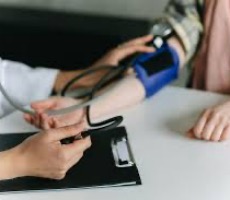Understanding Hypertension

Understanding Hypertension – an article by Dr. Deepika Kohli – a well-known Dietitian/Nutritionist and a Certified Diabetes Educator from Pfizer in 2011. She is a member of Indian Dietetic Association. Must read… Dr. Purnima Sharma, Secretary General & Editor of WOW Website…
Understanding Hypertension:
Definition, Normal vs. Elevated Values, and Dietary Management
Hypertension, commonly known as high blood pressure, is a chronic medical condition characterized by elevated blood pressure levels in the arteries. Blood pressure is the force of blood pushing against the walls of the arteries as the heart pumps blood throughout the body. Hypertension is a significant risk factor for cardiovascular disease, including heart attack, stroke, and other complications, making its management
crucial for overall health.
**Definition of Hypertension* *
Hypertension is typically defined as blood pressure measurements consistently higher than normal. Blood pressure is measured in millimetres of mercury (mmHg) and is recorded as two numbers:
- * *Systolic Pressure**: The first (top) number represents the pressure in the arteries when the heart beats or contracts to pump blood.
- **Diastolic Pressure**: The second (bottom) number represents the pressure in the arteries when the heart is at rest between beats.
- *Normal vs. Elevated Blood Pressure Values* *
The American Heart Association (AHA) classifies blood pressure values into the following categories:
* *Normal**: Systolic pressure less than 120 mmHg and diastolic pressure less than 80 mmHg.
- * *Elevated**: Systolic pressure between 120-129 mmHg and diastolic pressure less than 80 mmHg.
- * *Hypertension Stage 1**: Systolic pressure between 130-139 mmHg or diastolic pressure between 80-89 mmHg.
- * *Hypertension Stage 2**: Systolic pressure 140 mmHg or higher or diastolic pressure 90 mmHg or higher.
- * *Hypertensive Crisis**: Systolic pressure higher than 180 mmHg and/or diastolic pressure higher than 120 mmHg.
It’s important to note that elevated blood pressure values may require lifestyle modifications and close monitoring to prevent progression to hypertension.
- *Dietary Management for Hypertension* *
Diet plays a crucial role in managing hypertension by reducing blood pressure levels and lowering the risk of cardiovascular complications. Here’s a detailed look at dietary recommendations for individuals with hypertension:
- * *DASH Diet**: The Dietary Approaches to Stop Hypertension (DASH) diet is a well-established dietary pattern that emphasizes fruits, vegetables, whole grains, lean proteins, and low-fat dairy products while limiting saturated fats, cholesterol, and sodium. The DASH diet has been shown to significantly lower blood pressure levels.
- * *Limit Sodium Intake**: Excessive sodium intake can contribute to high blood pressure. Aim to limit sodium consumption by avoiding processed and packaged foods, which are often high in sodium, and using herbs, spices, and other flavourings to season meals instead of salt.
- * *Increase Potassium-Rich Foods* * Potassium helps counteract the effects of sodium on blood pressure. Include potassium rich foods such as bananas, oranges, spinach, sweet potatoes, and beans in your diet.
- * *Magnesium-Rich Foods**: Magnesium plays a role in regulating blood pressure. Foods high in magnesium include leafy green vegetables, nuts, seeds, whole grains, and legumes.
- * *Limit Alcohol Consumption**: Excessive alcohol consumption can raise blood pressure levels. If you choose to drink alcohol, do so in moderation (up to one drink per day for women and up to two drinks per day for men).
- * *Maintain a Healthy Weight**: Excess weight is a risk factor for hypertension. Aim to achieve and maintain a healthy weight through a balanced diet and regular exercise.
- * *Monitor Caffeine Intake**: While moderate caffeine intake is generally safe for most people, excessive caffeine consumption may temporarily raise blood pressure levels. Limit caffeine intake from sources such as coffee, tea, and energy drinks if needed.
- * *Be Mindful of Portion Sizes**: Pay attention to portion sizes to avoid overeating, which can contribute to weight gain and high blood pressure.
In conclusion, hypertension is a common medical condition characterized by elevated blood pressure levels in the arteries. Dietary management plays a crucial role in controlling blood pressure and reducing the risk of cardiovascular complications. By following a heart-healthy diet rich in fruits, vegetables, whole grains, lean proteins, and low-fat dairy products while limiting sodium, alcohol, and processed foods, individuals with hypertension can support overall heart health and improve their quality of life. It’s essential to work closely with a healthcare provider or registered dietitian to develop a personalized dietary plan tailored to individual needs and preferences.

